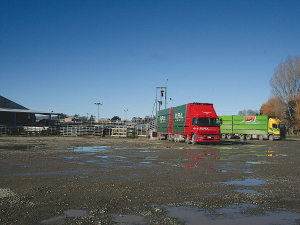About now, many cull cows will start leaving farms around the country.
Let your transporter know in advance if you are sending any tall cattle, horned cattle, or cattle with vet certificates.
If you’re unsure, seek advice from your vet.
Minimise transport distance
Request that cull cows be sent to a processing facility nearby. Minimising transport time and distance is better for the cow and you, because risk of injury or going down increases with time and distance.
Only transport cows that are not likely to give birth during the journey or within 24 hours of arriving at the destination. If cos are within four weeks of calving date, travel should be less than 2 hours.
Discuss tall cattle with your transporter
Always let your transport company know if you have any larger or taller cows or bulls in the load. A single deck truck is best for tall animals, otherwise they should be loaded on the bottom deck to minimise the risk of back rub.
Also tell your transporter if any of the cattle have horns. In most instances, horned cattle should be penned separately on the truck to prevent injury other animals.
Make sure she’s fit for transport
Contact your vet, transport operator or processing company if you are unsure whether an animal is fit for transport.
No signs of ill health
No visible wounds, bleeding, disease, deformity or infection
No ingrown or recently removed horns
Cancer eye lesions must be confined to the eye, smaller than 2cm and not bleeding or discharging.
Able to bear weight evenly on all four limbs
The right Body Condition Score - BCS 3 or greater. Cows with BCS below 3 will require a veterinary certificate and can only be transported to slaughter or better grazing, not to saleyards.
Stand cows off green feed for at least 4 hours
Stand stock off green feed for at least 4 hours (but for no more than 12 hours). A grazed-out paddock or stand-off pad are better options because concrete surfaces can contribute to tender feet and aren’t good for lying.
Give extra calcium
Lactating cows need extra calcium, in addition to extra magnesium, on the day of transport. Ideally, provide as an oral drench. Alternatively, provide a slurry with hay or dust pasture. If there’s no roughage on hand, it is possible to mix with dry feed/meal in troughs in the yard. Use the same rates as for colostrum cow supplementation.
Provide roughage and water
Continue feeding silage, hay or straw during stand-off, especially for lactating cows or prior to long-distance journeys. Ensure all stock have access to water prior to loading.
Many farmers have plumbed in a basic water trough at the yards that can be filled whilst the yards are in use. Remember, this will be their last chance to eat and they won’t get a drink until they arrive.
More info: https://www.dairynz.co.nz/animal/transporting-stock









